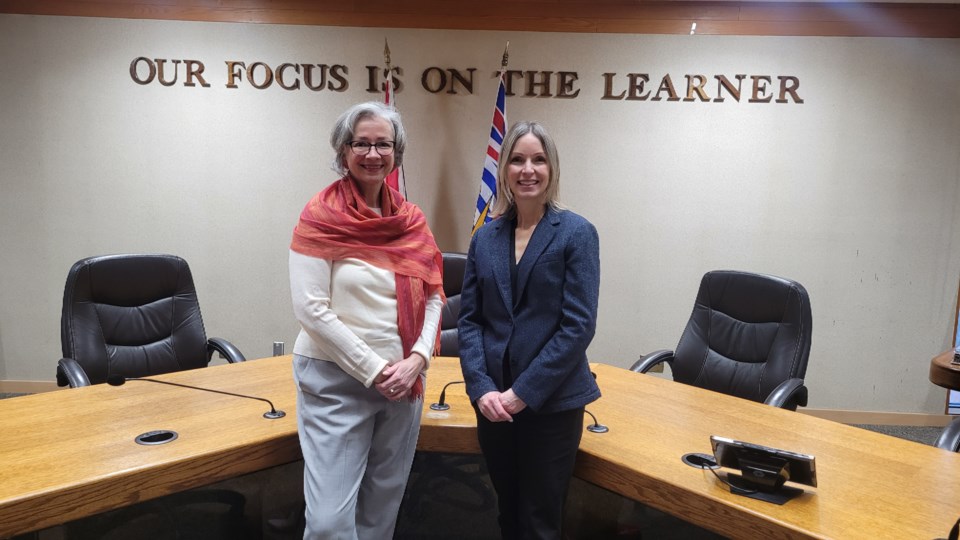Richmond children and youth with mental health and substance-use challenges now have access to a new support service through schools.
B.C.’s Minister of Mental Health and Addictions, Jennifer Whiteside, was joined by members of the Integrated Child and Youth (ICY) teams and Richmond South Centre MLA Henry Yao on Thursday at the Richmond School District office to announce the launch.
Richmond is one of the first, school district communities to launch the ICY teams mental health hubs, alongside Coast Mountains region, Okanagan-Similkameen, Maple Ridge-Pitt Meadows and the Comox Valley.
“Every child and family in British Columbia deserve strong health-care services, including access to mental-health and substance-use supports,” said Whiteside.
“Integrated Child and Youth teams fill gaps and better co-ordinate mental-health and substance-use care, making it easier for families in Richmond to access the help they need, when and where they need it.”
The program offers support and services including assessment and screening, consultation and therapeutic services, to children and youth 19 years old and younger within a school district boundary.
Youth can connect with ICY teams through early years services, school staff, primary care, mental health and substance-use services, Foundry centres and Indigenous-led organizations.
When connecting with youth and families to clinical, peer and cultural supports, ICY teams will meet them in places “they feel most comfortable” in such as schools, homes or community settings.
The Richmond News previously reported that two schools in Richmond would house ICY teams to help students and families connect to services with the program funded largely by the province.
Whiteside described the program as unique and “promising” due to the required “depth of relationship and the cross-agency work” to run the ICY teams.
The program funnels through a main channel and connects youth within the Richmond School District to different agencies and service providers that often require outside referrals.
The model for the ICY teams program, Whiteside added, was developed after reviewing a national research on best ways to provide services to youth in an integrated way.
“We’re trying to bring all of those systems together at the grassroots at the community level to ensure we’ve got a more seamless approach,” she said.
“It’s about building these pathways around the youth, but that pull in services that would typically have been outside of the school.”
Mental health needs still increasing
Karen Barclay, director for mental health and substance use with Vancouver Coastal Health (VCH), said the health authority has seen an increase in referrals for mental health and substance use programs.
“It’s unfortunate that those referrals are needed, but we’re here and we do have a great central intake process in Richmond to help these youth and families,” said Barclay.
“It’s actually something we’re happy to see … that support is being provided to these youth.”
Since April, 390 children and families in Richmond have used the program through the integrated service teams, Barclay added.
She said the largest spike for mental health service and support is in the youth and young adult populations, which is the reason why it is “critically important” to provide programs like ICY teams through schools.
Meanwhile, Whiteside addressed the ongoing provincial mental health crisis and the calls from the public for more help.
“Mental health issues were a growing concern and there was an increasing recognition that we needed to really invest in and ramp up our supports around mental health,” she said.
The timing of the COVID-19 pandemic, however, did not help either.
B.C.’s two public health emergencies, COVID-19 pandemic and the toxic drug crisis emergency, simultaneously placed “tremendous pressure” on the health authorities and schools, according to Whiteside.
Most concerns from the public revolved around the need for mental health support and substance use in response to the toxic drug crisis, she added.
“What I’m hearing across the board is the increased need everywhere and that’s why we are here today to look at some of the innovative approaches that we are implementing and developing in order to expand the services and supports for children and youth … and adults,” said Whiteside.
Whiteside highlighted the Foundry’s response to “ramp up” services to respond to the impact of the crisis during the pandemic.
More investments to expand substance use treatments beds and additional counselling services are in the works at the ministry to bring a “faster and efficient” approach to address the needs of B.C. residents.



